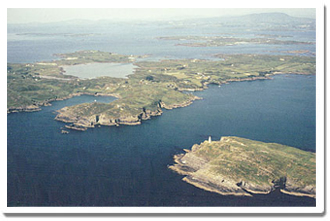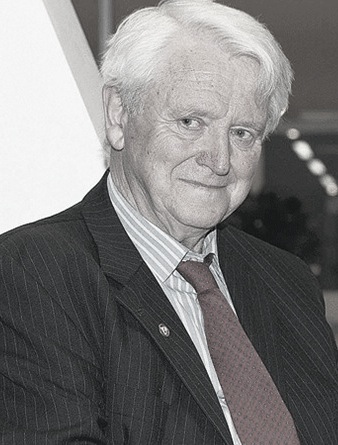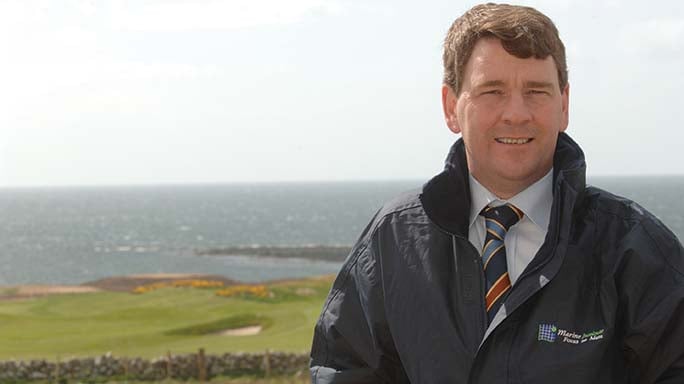Displaying items by tag: Sherkin
We Can't Breathe Without The Sea
The dominant subject in the past week has been the weather – pictures on television and in the newspapers of water pouring through streets, into houses, shops, stranded cars and so on – bringing in its wake flooding, destruction, tragedy in its effects on people’s lives. I have heard from seafarers who faced appalling conditions at sea - winds gusting from 50 miles an hour, up to 100, accompanied by massive seas, huge waves. Nightly on television the weather maps have shown where it was all coming from – across the oceans – spinning over the Atlantic, moving in the jet stream, lashing the first land mass it encountered, THIS ISLAND NATION…..
 Sherkin Island in West Cork
Sherkin Island in West Cork
Nature does show us humans at times just how little we can control her moods and what can be unleashed upon us and I wonder if people fully realise the importance of the oceans.
Matt Murphy lives on one of our offshore islands which felt the first lash of the gales in the past week. That’s Sherkin Island off Baltimore in West Cork where he founded and has run the Sherkin Marine Station for 40 years and was an early exponent of the need to be aware of climate change:
Matt outlined his views to me in an interview which you can hear on the audio Podcast of THIS ISLAND NATION above.
 Matt Murphy
Matt Murphy
I attended a seminar in Dublin a fortnight ago as part of the Sea for Society programme, which is an extensive European Commission project, promoting the opportunities in the seas, but also warning about the threats to them from human behaviour. The seas, the oceans are a marvellous place, so vital to our human welfare, but at the seminar I wondered if those of us who are aware of the maritime importance in life are talking to ourselves and that the message may not be getting through to the public at large. Have you ever listened, really listened, to the sounds of the ocean?
It is worth listening to these unusual sounds, which you can hear on the Podcast. For example, have you ever heard the sound a haddock makes?
 Dr. Peter Heffernan
Dr. Peter Heffernan
Those sounds should, surely, make one think about life in the oceans and men like Dr.Peter Heffernan do. He is Chief Executive of the Marine Institute which carried out a seabed survey between Newfoundland and Ireland in the past year.
He summarised for me the importance of the oceans:
You can hear Peter Heffernan outline in the Podcast why “every time we breathe… we need the sea….”
Indeed we do …. Let’s remember that…….
Sailing School Navigates Beyond the Gloom
The Principal John Moore has discounted all prices by 20 to 30%. All 2009 sailors returned in 2010 and brought friends with them. The French network of the newly appointed Director of Sailing Hugues Traonmilin has brought French families to the island and the French sailors were mixed with the Irish and British children and adults with great success. In addition to a busy summer season, 60 students of a South East College came for the very first time to the Sailing School in March 2010 as part of the Transition Year programme. They were hosted with full board accommodation at the Sailing School Guest house.
Definitely the location of the Sailing School plays a big part in this success story. Heir Island is located in the middle of Roaring Water Bay half way between Schull and Baltimore. Whatever direction you sail from the Sailing School beach, you'll encounter wonderful maritime landscapes and crystal clear waters. The Topaz dinghy fleet may sail to 3 or 4 different sandy beaches on one sailing day. The 3 Dublin Bay Mermaids sailing in flotilla explore the surrounding islands of Castle Island, Sherkin Island, the 3 Calves Islands and of course the Carthy's Islands to visit the seals colony.
Such a fantastic location has orientated the programme of this Sailing School towards the "Adventure" courses of the Irish Sailing Association. The school offers Adventure 1 & 2 courses as their "speciality" course.
2011 perspectives are already very encouraging with a second college to be hosted in Spring for a 10 day transition programme meanwhile the first one is returning after excellent feedback of the 2010 students and teachers. Being a family run business makes this small company very flexible and the range of their activities covers young sailors from 8 years old to adults, groups and families, on dinghies or on a traditional Heir Island Lobster Boat, and on kayaks if you don't want to sail. Also as a qualified Yachtmaster Instructor, the director of sailing has facilitated individually tailored sail training for yacht owners aboard their own yacht, an option that has proven both practical and successful.
More information HERE.





























































